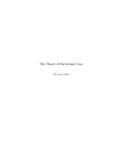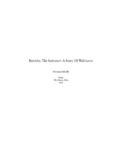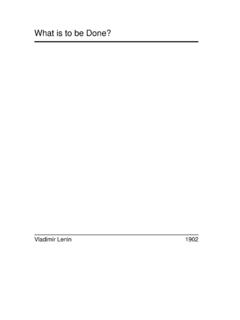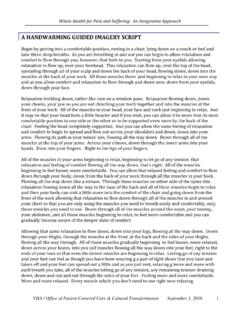Transcription of The Path of the Law
1 The path of the LawOliver Wendell Holmes, Harvard Law Review 457 (1897)WHEN we study law we are not studying a mystery but a well-known profession. We are studying what we shall want in orderto appear before judges, or to advise people in such a way as tokeep them out of court. The reason why it is a profession, why people willpay lawyers to argue for them or to advise them, is that in societies likeours the command of the public force is intrusted to the judges in certaincases, and the whole power of the state will be put forth, if necessary, tocarry out their judgments and decrees. People want to know under whatcircumstances and how far they will run the risk of coming against whatis so much stronger than themselves, and hence it becomes a business tofind out when this danger is to be feared. The object of our study, then, isprediction, the prediction of the incidence of the public force through theinstrumentality of the means of the study are a body of reports, of treatises, and of statutes,in this country and in England, extending back for six hundred years, andnow increasing annually by hundreds.
2 In these sibylline leaves are gath-ered the scattered prophecies of the past upon the cases in which the axewill fall. These are what properly have been called the oracles of the the most important and pretty nearly the whole meaning of every neweffort of legal thought is to make these prophecies more precise, and togeneralize them into a thoroughly connected system. The process is one,from a lawyer s statement of a case, eliminating as it does all the dramaticelements with which his client s story has clothed it, and retaining onlythe facts of legal import, up to the final analyses and abstract universals oftheoretic jurisprudence. The reason why a lawyer does not mention thathis client wore a white hat when he made a contract, while Mrs. Quicklywould be sure to dwell upon it along with the parcel gilt goblet and the sea-coal fire, is that he foresees that the public force will act in the same waywhatever his client had upon his head.
3 It is to make the prophecies easierto be remembered and to be understood that the teachings of the decisions1 path of the Law2of the past are put into general propositions and gathered into textbooks,or that statutes are passed in a general form. The primary rights and du-ties with which jurisprudence busies itself again are nothing but prophe-cies. One of the many evil effects of the confusion between legal and moralideas, about which I shall have something to say in a moment, is that the-ory is apt to get the cart before the horse, and consider the right or the dutyas something existing apart from and independent of the consequences ofits breach, to which certain sanctions are added afterward. But, as I shalltry to show, a legal duty so called is nothing but a prediction that if a mandoes or omits certain things he will be made to suffer in this or that way byjudgment of the court; and so of a legal number of our predictions when generalized and reduced to a sys-tem is not unmanageably large.
4 They present themselves as a finite body ofdogma which may be mastered within a reasonable time. It is a great mis-take to be frightened by the ever-increasing number of reports. The reportsof a given jurisdiction in the course of a generation take up pretty muchthe whole body of the law, and restate it from the present point of view. Wecould reconstruct the corpus from them if all that went before were use of the earlier reports is mainly historical, a use about which I shallhave something to say before I have wish, if I can, to lay down some first principles for the study of thisbody of dogma or systematized prediction which we call the law, for menwho want to use it as the instrument of their business to enable them toprophesy in their turn, and, as bearing upon the study, I wish to point outan ideal which as yet our law has not first thing for a businesslike understanding of the matter is to un-derstand its limits, and therefore I think it desirable at once to point outand dispel a confusion between morality and law, which sometimes risesto the height of conscious theory.
5 And more often and indeed constantly ismaking trouble in detail without reaching the point of consciousness. Youcan see very plainly that a bad man has as much reason as a good one forwishing to avoid an encounter with the public force, and therefore you cansee the practical importance of the distinction between morality and law. Aman who cares nothing for an ethical rule which is believed and practisedby his neighbors is likely nevertheless to care a good deal to avoid beingmade to pay money, and will want to keep out of jail if he take it for granted that no hearer of mine will misinterpret what I haveto say as the language of cynicism. The law is the witness and external de-posit of our moral life. Its history is the history of the moral developmentof the race. The practice of it, in spite of popular jests, tends to make goodPath of the Law3citizens and good men.
6 When I emphasize the difference between law andmorals I do so with reference to a single end, that of learning and under-standing the law. For that purpose you must definitely master its specificmarks, and it is for that that I ask you for the moment to imagine yourselvesindifferent to other and greater do not say that there is not a wider point of view from which the dis-tinction between law and morals becomes of secondary or no importance,as all mathematical distinctions vanish in presence of the infinite. But I dosay that that distinction is of the first importance for the object which we arehere to consider a right study and mastery of the law as a business withwell understood limits, a body of dogma enclosed within definite lines. Ihave just shown the practical reason for saying so. If you want to know thelaw and nothing else, you must look at it as a bad man, who cares only forthe material consequences which such knowledge enables him to predict,not as a good one, who finds his reasons for conduct, whether inside thelaw or outside of it, in the vaguer sanctions of conscience.
7 The theoreticalimportance of the distinction is no less, if you would reason on your subjectaright. The law is full of phraseology drawn from morals, and by the mereforce of language continually invites us to pass from one domain to theother without perceiving it, as we are sure to do unless we have the bound-ary constantly before our minds. The law talks about rights, and duties,and malice, and intent, and negligence, and so forth, and nothing is easier,or, I may say, more common in legal reasoning, than to take these wordsin their moral sense, at some state of the argument, and so to drop into fal-lacy. For instance, when we speak of the rights of man in a moral sense,we mean to mark the limits of interference with individual freedom whichwe think are prescribed by conscience, or by our ideal, however it is certain that many laws have been enforced in the past, and it islikely that some are enforced now, which are condemned by the most en-lightened opinion of the time, or which at all events pass the limit of inter-ference, as many consciences would draw it.
8 Manifestly, therefore, nothingbut confusion of thought can result from assuming that the rights of manin a moral sense are equally rights in the sense of the Constitution and thelaw. No doubt simple and extreme cases can be put of imaginable lawswhich the statute-making power would not dare to enact, even in the ab-sence of written constitutional prohibitions, because the community wouldrise in rebellion and fight; and this gives some plausibility to the proposi-tion that the law, if not a part of morality, is limited by it. But this limit ofpower is not coextensive with any system of morals. For the most part itfalls far within the lines of any such system, and in some cases may extendPath of the Law4beyond them, for reasons drawn from the habits of a particular people at aparticular time. I once heard the late Professor Agassiz say that a Germanpopulation would rise if you added two cents to the price of a glass of statute in such a case would be empty words, not because it was wrong,but because it could not be enforced.
9 No one will deny that wrong statutescan be and are enforced, and we would not all agree as to which were thewrong confusion with which I am dealing besets confessedly legal concep-tions. Take the fundamental question, What constitutes the law? You willfind some text writers telling you that it is something different from whatis decided by the courts of Massachusetts or England, that it is a system ofreason, that it is a deduction from principles of ethics or admitted axioms orwhat not, which may or may not coincide with the decisions. But if we takethe view of our friend the bad man we shall find that he does not care twostraws for the axioms or deductions, but that he does want to know whatthe Massachusetts or English courts are likely to do in fact. I am much ofthis mind. The prophecies of what the courts will do in fact, and nothingmore pretentious, are what I mean by the again a notion which as popularly understood is the widest con-ception which the law contains the notion of legal duty, to which alreadyI have referred.
10 We fill the word with all the content which we draw frommorals. But what does it mean to a bad man? Mainly, and in the first place,a prophecy that if he does certain things he will be subjected to disagreeableconsequences by way of imprisonment or compulsory payment of from his point of view, what is the difference between being fined andtaxed a certain sum for doing a certain thing? That his point of view isthe test of legal principles is proven by the many discussions which havearisen in the courts on the very question whether a given statutory liabilityis a penalty or a tax. On the answer to this question depends the decisionwhether conduct is legally wrong or right, and also whether a man is un-der compulsion or free. Leaving the criminal law on one side, what is thedifference between the liability under the mill acts or statutes authorizinga taking by eminent domain and the liability for what we call a wrongfulconversion of property where restoration is out of the question?










